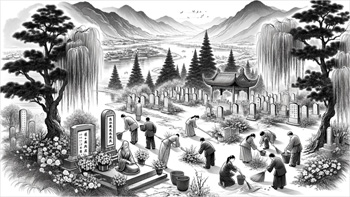 Qingming Festival in China
Qingming Festival in China


The Qingming Festival, also known as Tomb-Sweeping Day, is a traditional Chinese festival observed on the 15th day after the Spring Equinox, typically falling around April 4th or 5th. It's a time when the Chinese people pay respect to their ancestors and the deceased, a practice deeply rooted in Chinese culture. The festival's significance extends beyond mere ritual, offering a profound insight into Chinese attitudes toward family, life, and the natural world. In this article, we'll explore the history, customs, and modern-day relevance of the Qingming Festival in China.
Qingming's origins are as ancient as they are poignant. The festival has been traced back to the Zhou Dynasty over 2,500 years ago. It started as a day for paying respect to ancestors and has evolved to encompass the celebration of spring. The name 'Qingming' itself means 'clear and bright', indicating the time of year when spring blossoms and the earth becomes fresh and green again. This dual focus on ancestry and nature makes Qingming a unique blend of somber remembrance and joyful celebration of life and renewal.
Historical Background and Significance
The festival's historical significance is deeply intertwined with Chinese culture and philosophy. Traditionally, it was believed that paying respects to ancestors ensured their blessings on the living family members. This practice was not only a familial duty but also a manifestation of the Confucian value of filial piety, which holds a central place in Chinese moral values. Qingming was, and still is, a day to exemplify respect, gratitude, and remembrance for one's ancestors.
The festival also carries tales and legends, one of the most famous being the story of Jie Zitui, a loyal follower who died in a fire set by Duke Wen of Jin during a period of exile. To commemorate Jie's loyalty, the Duke declared a day of remembrance that eventually evolved into the Qingming Festival. This tale underscores themes of loyalty, sacrifice, and the importance of remembering the good deeds of others.
Traditional Customs and Activities
During Qingming, families visit the graves of their ancestors to clean the site, sweep the tombstones, and remove weeds. This act, known as 'tomb sweeping', is a way to show respect for the deceased and ensure their comfort in the afterlife. Offerings are made, including food, tea, wine, joss sticks, and paper money. These offerings are not just ritualistic; they are heartfelt gestures of remembrance and reverence.
Beyond tomb sweeping, Qingming is also a time for families to spend time together outdoors, enjoying the beauty of spring. This practice is known as 'taqing', which means 'spring outing'. People go for walks in the countryside, fly kites, and enjoy picnics. The flying of kites, especially those with lanterns attached that are let go into the sky at night, is a symbolic act believed to bring good fortune and ward off evil spirits.
Food and Culinary Traditions
Food plays a significant role in the Qingming Festival. One of the traditional foods is Qingming cake, also known as 'qingtuan', a green-colored glutinous rice ball filled with sweet or savory fillings. The green color comes from the juice of 'maqing' grass, a wild herb that symbolizes the fresh green of spring. People also consume cold food on this day, a tradition stemming from the ancient practice of refraining from using fire as a mark of respect to ancestors.
Another popular dish is 'chongyang cake', made of rice flour and steamed with various fillings. These foods are not only delicious but carry symbolic meanings, representing health, prosperity, and the cycle of life and death in nature.
Modern Observance and Cultural Impact
In modern times, the Qingming Festival has retained its significance but has also adapted to contemporary life. Urbanization and busy lifestyles have led to the rise of online memorial services, allowing families who cannot travel to gravesites to pay their respects virtually. This adaptation shows the resilience of traditional values in the face of modern challenges.
Moreover, Qingming is also an opportunity to educate younger generations about their family history and cultural heritage. It serves as a bridge connecting the past with the present, ensuring that ancestral stories and traditions are passed down through generations.
The Qingming Festival is more than a traditional observance; it's a vibrant testament to the enduring nature of Chinese culture. Its emphasis on family, respect for the past, and the celebration of life reflects the deep-rooted values that are central to Chinese identity. As the world becomes more globalized, understanding and appreciating such cultural practices becomes increasingly important, offering insights into the rich tapestry of human traditions and shared values.